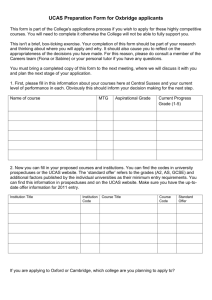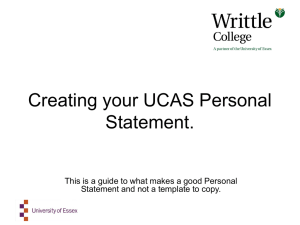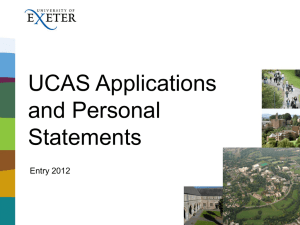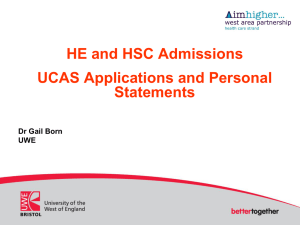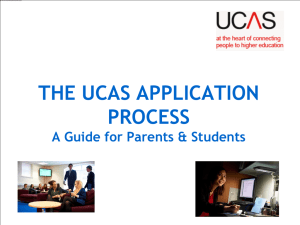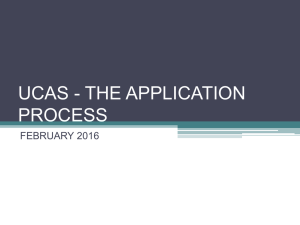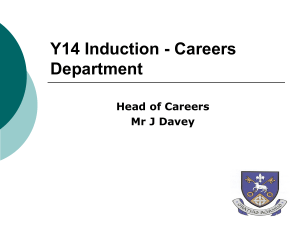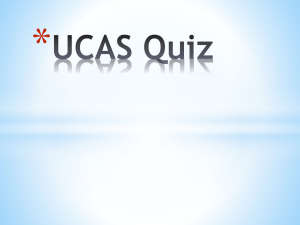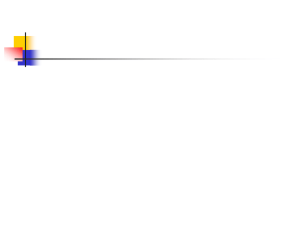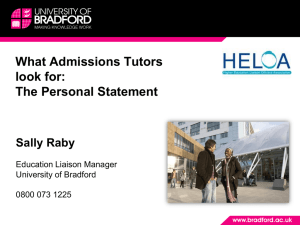Applying_to_University_Parents_guide
advertisement
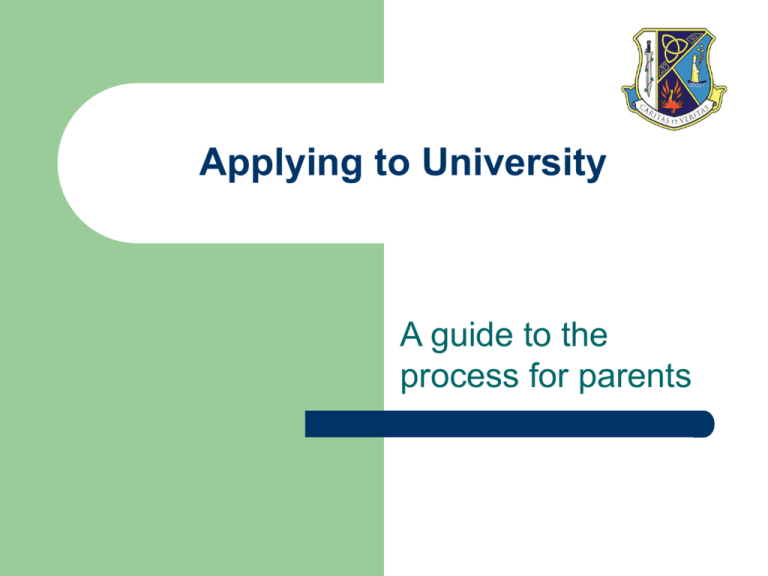
Applying to University A guide to the process for parents What is it? University and College Admissions Service •Students •Parents •Advisers •HE staff •About us It is a charitable organisation which manages applications to UK higher education courses in N. Ireland, England, Scotland and Wales. The Process The student registers with UCAS. This is done on-line at www.ucas.com The student will then receive an Applicant welcome booklet which explains the rest of the UCAS process as well as a personal ID number. You too can access the parents’ pages at www.ucas.com where there is information and assistance should you need it! Part 1-Personal Details personal information (name, address etc) contact details (telephone, email address) student support (finance arrangements) criminal convictions disabilities/ special needs occupational background of highest household earner Part 2- Course choices Students are allowed to make up to a maximum of five course choices. I normally suggest four to allow for a ‘change of mind’ later. Additional course choices up to the quota can be made after submission of the application. There is no order of priority required as the choices will be printed alphabetically. Points to note re choices Students applying to Oxbridge can only apply to one of the institutions, either Cambridge or Oxford. Students applying for medicine can only apply for four medical schools. Some institutions require additional entrance tests for their courses; UKCAT or BMAT for medicine, dentistry, veterinary science / medicine. HPAT for allied health professions (physiotherapy, radiography,podiatry, optometry, speech and language therapy etc. LNAT for Law STEP for Mathematics Critical Thinking Skills Students are encouraged to practise for these tests. Sample papers are available on-line or in the careers suite. Part 3 - Education Students provide the results, dates and the examining board of all public examinations under taken or to be taken. GCSE GCE AS level GCE A2 BTEC level 3 Additional recognised awards such as music (theory /practical), speech and drama, COPE etc. Education – Grades and Re-sits All students must record their AS grades on their application form even if they are re-sitting a module in January. However, a student can decide whether to add in the results of each module or not. I discuss this with the student as sometimes there are advantages in not doing this! Sometimes the institutions contact us for confirmation of the module results achieved at AS level if they are not recorded but this is rare. If a student is repeating AS levels, then he/she records ‘pending’ and the new final grade will follow in August. Part 4 - Employment Students are invited to provide details of any paid employment. Employer Address Nature of the work. Part 5 – The Personal Statement This is the most crucial part of the application for several reasons. Many institutions do not hold interviews. Admissions tutors rely heavily on the information provided in the personal statement when making their decision. It is the student’s opportunity to ‘sell themselves’ and personalise the application. Personal Statement It is vital that your son / daughter takes a lot of time preparing the personal statement. He / she should never lie or embellish situations as they will be detected at interview. It must be written by him / her and not ‘copied’ from another source. (UCAS runs all applications through a similarity detection system that looks for matches with internet sources and other statements) Part 6 – The Reference All your son’s / daughter’s teachers submit a subject specific report to the referee detailing a predicted grade, aptitude for the subject and his / her commitment and capacity for work. Each student has filled in a ‘student information sheet’ which allows the student to provide relevant additional information to the referee. The referee will then compile all the information provided by the students, teachers along with personal information, e.g., personality, contribution to school, hobbies, achievements, experiences etc. Students will have the opportunity to read the reference before it is sent to UCAS. Part 7 - Payment The application fee costs £23.00 Payment can be made in two ways; By credit / debit card directly to UCAS By paying directly to the bursar’s office here in school. Note: the application will not be sent to UCAS before payment has been made. The next stages UCAS processes the applications which are then forwarded to the appropriate institutions within one day of receipt. Students will then receive a ‘welcome letter’, a personal identification number and confirmation of the courses applied to for verification. Students will be able to access the progress of their application, reply to offers etc and make additional choices through the on-line ‘tracking system’. University Decisions Once an institution has received the application, the admissions team will do one of the following; Make a ‘conditional offer’ which requires the student to meet previously specified criteria, e.g., grades, points and subjects. Make an ‘unconditional offer’ guaranteeing a place without meeting specified criteria. Decline to make an offer whereby the student is unsuccessful in the application. The student’s response When a student has received notification from all of the institutions, he / she will be asked to select two courses, one of which is CF (firm conditional) and is usually their preferred choice and their second choice CI (insurance conditional). This is usually done by 5th May What if the student is unsuccessful and has received no offers? This is where the fifth option can be used! Alternatively, if all five options have been unsuccessful, he / she can make another course choice through ‘Extra’. In this case, they can find out where courses haven’t been filled and can make an additional application but this can only be done one course at a time. Post Results If the student meets the requirements of the CF or the CI, then they are guaranteed their place on the course. Information should be received from the institution within a couple of days (if not on the day of the results). This again can be checked on ‘Track’. If the student exceeds expectations, then he / she is eligible for ‘adjustment’ where places are available at alternative institutions. If the student falls short of the grades required and is unsuccessful, then he / she is eligible for ‘clearing’. Additional Points of Information University of Ulster ‘Gathered Fields’ - University of Ulster will not be allocating places until after 15 January deadline when all applications have been received. Grade Ranges- Some courses have had a grade range of UCAS tariff points introduced e.g., 260 –300 and dependent on the number of applicants, the exact requirement will be applied, e.g., 280. Increased entry requirement for a number of courses. These can be found on the online prospectus at www.prospectus.ulster.ac.uk Insight nights for Health Sciences, Engineering, Art and Design, Built Environment etc Additional Points of Information Queen’s University All applications for nursing / midwifery are on a separate application form although being reviewed this year. St Mary’s University College (QUB) separate application form New interviewing process for medicine and dentistry Information evenings for parents – Engineering Humanities, Maths, Business Management Precise grades only for medicine, dentistry and pharmacy Above target grade – Actuarial Science, Biomedical Science, Criminology, Film Studies, Physics, Psychology and Spanish Further information at www.qub.ac.uk Most of all Don’t Panic!! There will be lots of help here at the College! Dates and Deadlines 15th October - all Cambridge and Oxford applications 15th October – all medicine, dentistry, veterinary medicine / science applications 7 January – St Mary’s University College 15 January – All other UCAS applications 24th March – all Art and Design applications 5th May – final two choices confirmed Thank you! Any Questions?
